Besides the Human Development Index (HDI), the Happiness Index (HPI) is seen as a comprehensive measure of people’s quality of life, quantifying factors such as employment, income, social security, education, healthcare, environment, culture, and satisfaction levels among residents.
According to Nguyen Van Phong, Standing Deputy Secretary of the Ha Noi Party Committee, including “happiness” in the Congress theme affirms the city’s determination to ensure that every official and Party member acts for the happiness of the people. This marks a shift from centralised management to multidimensional governance with clear decentralisation and accountability.
To build a “happy city,” Ha Noi’s Party Committee has prioritised environmental protection, expansion of green and water areas, improvement of air quality, and assurance of safe living conditions. The city aims to create a society where people feel they are cared for, shared, and respected.
One key highlight of Ha Noi’s governance reform has been integrating digital transformation into urban governance during the 2020–2025 period. With 62 mechanisms and policies issued to support start-ups and digitalisation, the city has prepared for the two-tier local governance model to take effect from July 2025, improving service delivery for residents. Smart city initiatives such as intelligent traffic systems, the online public service portal, and the digital urban operations centre have been rolled out.
Currently, all communes and wards in the city are equipped with fibre-optic infrastructure, 80% of adults own smartphones, and electronic payment rates account for over 50% of transactions. Many apps and platforms have been launched, including the iHaNoi digital citizen app, electronic health record, and issuance of judicial record via VNeID, along with interconnected databases linking taxation, land, and banking, helping reduce processing time and support residents in accessing transparent public services.
Truong Viet Dung, Deputy Chairman of the Ha Noi People’s Committee, emphasised that digital transformation is a new way to improve efficiency in management, production, business, education, healthcare, and culture. All processes are standardised, transparent, and measured by people’s and enterprises’ satisfaction levels.
Ha Noi has also renewed its approach and policy thinking through practical initiatives benefiting people and businesses, fuelling growth across multiple sectors.
For housing development, particularly the social housing segment, the city is finalising specific preferential policies. These include covering up to 50% of off-site infrastructure costs for standalone social housing projects and 100% for rental-only projects, as well as offering loans covering up to 80% of total investment over 25 years at interest rates 2–5% lower than commercial banks.
In addition, the city is planning dedicated social housing zones to ensure sufficient supply and meet the targets assigned by the government. All specific policies aim to attract businesses’ investment, reduce costs, and expand housing access for low-income people.
In reality, these social housing policies have made the dream of home ownership a reality for families in the capital. Vo Thi Hong Thai, a resident in the Dai Mo social housing project, shared: “Transparent implementation of social housing policies has helped families like ours afford a house in Ha Noi.”
Between 2026 and 2030, the city’s social housing development programme is expected to accelerate, with 50 projects planned to supply a total of 3.21 million square metres of floor area and over 57,000 apartments, including five concentrated zones covering more than 200 hectares and nearly 12,000 apartments.
To improve the environment and reduce transport congestion, Ha Noi is promoting public transport using electric and green-energy buses. In the coming period, participating enterprises will receive special incentives, with interest rate support expected to increase from 50% to 70%; the new support level will apply to 100% of the loan value during the project implementation period.
The political report of the 18th Ha Noi Party Congress sets a target for Ha Noi’s HPI to reach nine out of 10 by 2030. At the grassroots level, Minh Chau Commune has also set the goal of achieving an HPI of nine out of 10 at its first Party Congress, with measurable criteria such as regular healthcare for residents and improved environmental conditions.
In terms of priorities, Ha Noi is pursuing the goal of developing a green, sustainable, and people-centred urban planning. Architect Pham Thanh Tung, Chief of Office of the Viet Nam Association of Architects, stressed the need to restore Ha Noi’s true identity as a “city of rivers and lakes”, where rivers and lakes are not only reservoirs but also distinctive ecological and cultural spaces. He also called for greater investment in green and smart infrastructure.
Not only building a happy city for its own people, Ha Noi, as the nation’s capital, bears the mission of spreading this “happiness space.” Assoc. Prof. and Dr. Tran Dinh Thien, a member of the Prime Minister’s Policy Advisory Council, emphasised that Ha Noi must lead Viet Nam’s competitiveness and open a new vision to stand shoulder to shoulder with the world.

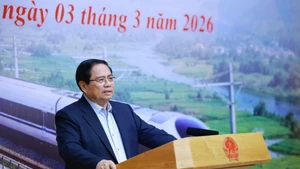

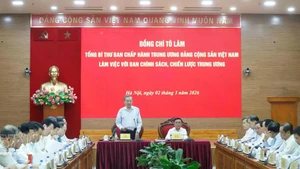

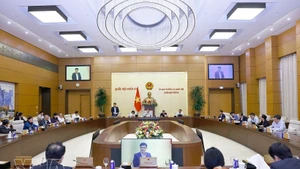
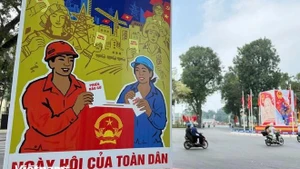

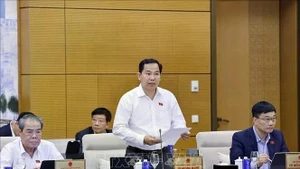
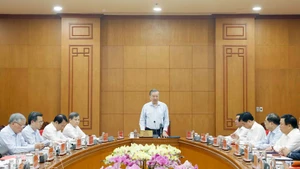




![[Video] Truong Sa's soldiers, residents ready for election day](https://en-cdn.nhandan.vn/images/f1d40292161293ec0cfc54f6f7bc133a6bbf8f5786a71df650a63a6227ff35da26ecfd78165d9aec37ebbf9c050c10f96ae70becd9f49b834a8b9195e077c25b/1080.jpg.webp)

